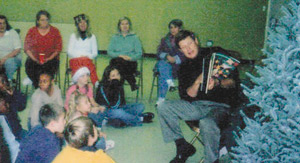When Ronnie Cox describes the innovative way his church is doing apartment ministry, he says he’s actually talking about a tried-and-true method as old as the first-century church itself.
 Ronnie Cox, pastor of Providence Baptist Church, Gaffney, reads the Christmas story at a special event as part of his church’s ministry to a nearby multi-housing community.
Ronnie Cox, pastor of Providence Baptist Church, Gaffney, reads the Christmas story at a special event as part of his church’s ministry to a nearby multi-housing community.The method seems new, he says, only because churches have become accustomed to the “‘y’all come’ mentality,” in which worship services and programming are designed to attract potential members. The result is that “we transfer believers between churches” as one church offers something more appealing than the next.
“Do the unchurched in our community care about these things?” asked Cox, pastor of Providence Baptist Church in Gaffney. He posed another question: “What would happen if we stopped trying to appeal to the community from inside the church and took quite literally the advice of Jesus by moving outside with our ministry?”
The geographic and socioeconomic challenges for Providence Baptist Church – it is surrounded by multi-housing complexes – render the build-it-and-they-will-come approach ineffective, Cox says. (The North American Mission Board estimates that half of all Americans live in multi-housing communities.) Apartment dwellers, he insists, will not attend an established church “for fear of not being accepted.”
However, “they will come to a place where there are people they know,” Cox said, and that is the key to building a ministry for those who can be described as a “people group” just as surely as any ethnic group that might be targeted by missiologists. “Residents of multi-housing communities have all of the characteristics that would make them a people group,” he said. “They often are of the same economic status, have the same kinds of problems and concerns, and even think somewhat alike.”
Armed with the mission of reaching out to a group instead of trying to reach individuals (Cox says apartment-by-apartment visitation yields “few positive results”), and by incorporating the model of the house church movement of the New Testament church, in which Christianity spread through entire household networks, Cox and some of his members set about establishing an ongoing church presence within the confines of the nearby multi-housing complexes.
“This is totally oriented toward people who don’t have a church background,” Cox said. “It actually becomes like a church there. When you look back at the New Testament house church, you find that.”
The goal, he said, is not to direct the people who live in the multi-housing units to his church (although they are welcome if they choose to come), but to establish a church presence onsite, where residents not only feel more accepted, but where they will in turn reach the people they know there. “Our goal is not to build our kingdom, but the kingdom of God,” he said.
When a ministry is started in a centralized housing complex, workers schedule special events (cookouts, kids’ clubs, Christmas parties, etc.) to begin building personal relationships. An organizational meeting with community residents is held to determine needs and to establish regular community meetings. Workers slowly begin discussing spiritual needs. Over time, the workers become a welcome asset to the multi-housing community as the sponsoring church commits to an ongoing, indefinite presence.
Once entrance has been gained and trust established, other possibilities for ministry open up, Cox said, including literacy training, tutorial services, health care issues, crisis intervention, job training, marriage counseling and more. “This is not social ministry, but holistic ministry that follows the pattern that Jesus used,” he said.
Cox’s church has an established ministry at two complexes and is beginning work at a third. “Our workers have actually become pastors to the community,” he said. “They visit them in hospitals, prepare meals for residents when there is a death, provide household goods for new residents, offer counsel to those who are troubled.”
The success of the apartment ministry depends on building trust, Cox said. “The possibilities for witness are endless. Once they trust us, they will listen to us. This can be a ministry that builds trust among pockets of people untouched by the gospel, resulting in multiplied opportunities to share the gospel.”
“We need to let people know that we are interested in being where they are,” he said.